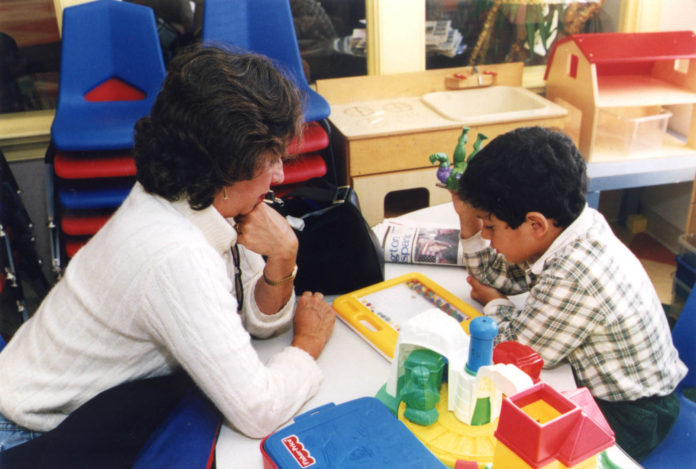Kansas Supreme Court justices on Tuesday dubiously greeted the state’s new education finance plan even while pressing the attorney for the plaintiff school districts about whether more money would improve student achievement.
Some justices questioned whether the new five-year, $525 million plan approved by the Legislature was sufficient to adequately fund schools, suggesting that the money appropriated by lawmakers wasn’t being funneled into the system fast enough.
Justice Dan Biles pushed the state attorneys hard, quizzing them about how the money allocated this year would be adequate five years from now.
“You’re funding today’s number five years from now, right?” Biles asked. “How does that make any sense?”

The state’s lawyers contended that the Legislature has put more than $1 billion into education during the last two years. They argued that should be enough to comply with the state constitutional requirement to provide suitable funding for education.
“This is a significant input of additional money,” Kansas Solicitor General Toby Crouse told the court. “We’re doubling the pace at which we’re adding money into the system.”
Crouse said the state is putting about the same amount of money into schools over the next five years as what it spent over the previous 10 years.
Yet Justice Marla Luckert raised a question similar to Biles’, asking, “If we accept this plan, do we have to accept that students will be underfunded for another five years?”
Crouse said the funding plan would be phased in just as it was supposed to have been from a previous education-funding case from the mid-2000s.
He said the state spent more than $200 million extra on schools last year and another $197 million this year, with more spending going forward.
“It is a fulsome funding system that is going into play,” he said. “It’s not ‘wait for five years.’ ”
Looming in the background during Tuesday’s hearing was a 2018 study that suggested the state should spend up to $2 billion more for education.
The plaintiff school districts latched onto that report as they made their case that the Legislature is still not adequately funding schools. The school districts’ own study recommended spending about $1.5 billion.
Justice Eric Rosen pointed out that the state has commissioned three education-funding studies in the last 18 years and that it doesn’t seem to want to implement any of them.
“There’s a lot of frustration here, I think, on your part, our part and the plaintiffs’ part,” Rosen said. “If this isn’t kind of a déjà vu, we-have-all-been-here-before moment, I don’t know what is.”

Usually in a trial, Rosen said, two sides put up different experts to support their case.
Not the state of Kansas.
“You all are always battling your own experts,” Rosen said. “It seems like you base your constitutional compliance and (funding) floor based on what you’re willing to spend and not what your own experts say it’s going to cost.”
Crouse conceded early on in the approximately 2 1/2-hour hearing that money matters in education.
“This court has said that money makes a difference, and we’re not here to argue differently,” he said.
Yet Crouse said the 2018 education-funding study by Lori Taylor of Texas A&M University went well beyond what’s constitutionally required.
He pointed out that the Taylor study recommendation sought to achieve a 95 percent graduation rate, a benchmark not achieved anywhere else in the country.
The Taylor study, the state argued, was based on “aspirational” goals that the Kansas Board of Education reported to the federal government under the Every Student Succeeds Act. State Education Commissioner Randy Watson called those goals a “moonshot.”
“That’s the standard by which Dr. Taylor created her model. It’s not the standard that the Legislature chose, and it’s certainly far beyond what the Constitution minimally requires,” Crouse said.
The attorney representing the school districts challenging the funding plan told the court that the state did not meet the court’s requirement to adequately fund schools.

“They have not provided poof that they are complying with your charge,” attorney Alan Rupe said. “We would ask the court to enter an order that gives the Legislature specific instruction on what needs to be done.”
Rupe said the funding plan approved by the Legislature this year would turn the clock back to before the trial court struck down the state’s school finance plan in 2012.
“Their trajectory gets us right back to where we were when we filed the case in the first place — in five years,” Rupe said.
At one point, Biles seemed to think Rupe wanted money to remediate damage caused by budget cuts over time, an issue the justice thought could mean sending the case back to the lower court to consider.
“I wouldn’t see it as remediation as much as spending what’s necessary to achieve the standards that the Kansas Constitution requires,” Rupe said.
Justice Rosen, however, told Rupe that the court isn’t trying to arrive at an “optimal” funding solution so much as it’s trying to determine a funding floor.
“Funding alone doesn’t make up or account for differences in student achievement,” Rosen said. “There are lots of other factors outside of the classroom that come into play.”
Rupe said the trial court record reflects that money bears on student performance, adding that some students may cost more to educate — an issue accounted for in the current funding formula.
“The structure right now is fine,” he said. “It’s just not enough money to drive results. That’s the problem.”
Biles cautioned against using student achievement statistics such as test scores to gauge whether the school-funding plan is constitutional.
“I hear you trying to say that the test of constitutionality basically occurs at the end of each school year when you take whatever exam we would be requiring,” Biles said. “That’s not it. Student performance was just part of the calculus.”















